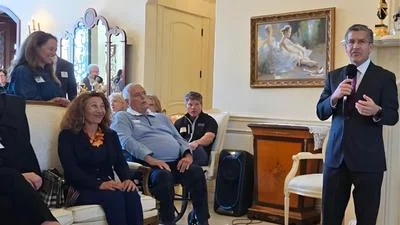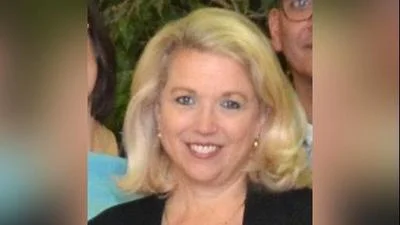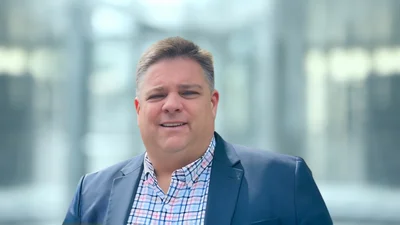Village of Bartlett Committee of the Whole met July 16.
Here is the minutes provided by the committee:
President Wallace called the Committee of the Whole meeting to order at 7:52 p.m.
PRESENT: Chairmen Camerer, Carbonaro, Deyne, Gabrenya, Hopkins, Reinke and President Wallace
ABSENT : None
ALSO PRESENT: Village Administrator Paula Schumacher, Assistant Village Administrator Scott Skrycki, Senior Management Analyst Samuel Hughes, Management Analyst Joey Dienberg, Finance Director Todd Dowden, Senior Planner Renee Hanlon, Public Works Director Dan Dinges, Public Works Engineer Bob Allen, Building Director Brian Goralski, Assistant Golf Pro Paul Galvan, Police Chief Patrick Ullrich, Deputy Chief Geoff Pretkelis, Deputy Chief Jim Durbin, Village Attorney Bryan Mraz and Village Clerk Lorna Giless.
BUILDING AND ZONING, CHAIRMAN HOPKINS
Illinois Cannabis Regulations and Tax Act
Chairman Hopkins asked staff to explain the item.
Senior Planner, Renee Hanlon stated that last month, Governor Pritzker signed into law the Cannabis Regulations and Tax Act which legalizes the consumption of cannabis by anyone over the age of 21 in the state of Illinois and the law will take effect January 1, 2020. As part of the law, the state recognizes the municipality’s role in zoning and regulation for these new cannabis businesses. Included in that is the allowance to expressly prohibit these new adult use dispensaries and other businesses as well. The law also authorizes municipalities that choose to allow the adult use dispensing facilities to place an additional 3% occupation tax on the sale of cannabis for recreational purposes that’s in addition to the normal sales tax. Beyond the dispensaries that will open up, the law also recognizes and establishes licensing procedures for the following additional cannabis businesses. There will be more cultivation operations licensed, craft growers, infusion operations and transportation. Currently, our zoning ordinance allows medical cannabis dispensaries by special use in the Villages industrial zoning districts. It also allows for medical cannabis cultivation operations. The zoning ordinance also has some distancing requirements from daycare centers, schools and residentially zoned property. When you take all of that into consideration, it leaves a limited number of properties in the Village that you could establish medical cannabis dispensaries or cultivation.
Staff has done a good amount of research and in doing so, they called surrounding municipalities to see where they are in the process. Many reported that they have not had that discussion yet and planned to do it in the fall. South Elgin’s Board has directed their staff to start drafting a zoning ordinance amendment that allows the dispensing of cannabis as a special use in all their commercial zoning districts. Staff believes the area that will be targeted for dispensaries will be the Randall Road corridor. Villa Park has already amended their zoning ordinance to allow these operations by special use in all of their commercial districts as well. Right now we are in the same boat as every other municipality in Illinois. The zoning ordinance will have to be changed one way or the other to recognize all of these new uses. Staff is looking for direction from the board as to how they want to draft the amendment.
President Wallace stated that we are so far ahead of other villages, he just wants to make sure this discussion is mostly theoretical. There is probably a lot more information from municipalities across the country.
Chairman Camerer asked if the highlighted bullet points in the packet were new to recreational marijuana.
Ms. Hanlon stated that the way the law is written, the first licenses for the adult use dispensaries are going to the 55 existing medical dispensaries in the state right not. The state is going to start accepting applications for existing medical dispensaries in October. The dispensary in St. Charles feels pretty certain that they will be applying for recreational dispensing and the state law allows them to open a second location for the adult use to keep it separated from the medical dispensing.
President Wallace asked if they expect to delineate between medical and recreational dispensaries.
Ms. Hanlon stated that because of the security requirements and accounting requirements are different for medical and recreational, they keep them separate. If a customer with a medical card comes in, they don’t pay taxes, but the next customer that is buying for recreational would need to pay the taxes, so it is more practical to have separate facilities.
President Wallace stated that he doubts there will be too many craft growers suppling the medical side.
Chairman Deyne asked if staff had an estimate on the amount of revenue that would be generated.
Ms. Hanlon stated that the estimates state wide are more than a billion dollars which is estimated by the number of users at the state and some tourism.
Finance Director Todd Dowden stated that based on rough estimates, a store that is slow, may bring in $500,000 and a busy store may bring in $2,000,000 a year. Two percent, the Villages portion of regular sales and home rule sales tax on $500,000 would be $10,000 per year. If we add the 3% allowable cannabis tax, it would be $25,000 for the year. If it was a store that made $2,000,000, our portion would be $40,000 or $100,000 per year.
President Wallace stated it was not a lot of money. He wanted some details on similar sized municipalities in Colorado and other states where it is legalized. He wanted police to reach out to their police department and emergency rooms to get some data on how many people are showing up to emergency rooms who have overdosed. This is not your everyday old weed. It is heavy duty stuff and wants to get that information for the next conversation.
Chairman Deyne stated that he had some concerns as well.
Chairman Hopkins stated that he had some concerns also, but he has had 22 residents reach out to him and 98% of them want legalized recreational marijuana in the village. He suggested putting it on the ballot as a referendum question. He wants more information and wants residents to be informed on the decision this board makes.
Village Attorney Bryan Mraz stated that because it goes into effect January 1, 2020, a referendum will not be able to get on the ballot until after the law goes into effect. If you decided to ban it, you could change it after you get results of the referendum. He thought some action needed to be taken regarding the zoning ordinance. If the Board wants to restrict it, they should amend the zoning ordinance and other ordinances may need to be amended if it is banned or not.
Trustee Reinke stated this is purely a zoning issue. Regardless of the decision on zoning, recreational marijuana will still be legal in Illinois so it sounds like we have 3 options. We can ban the sale of marijuana, allow it to certain zoning districts like the industrial parks or permit it broadly in all commercial districts.
Attorney Mraz stated that when the medical marijuana legislation came out, the Village did not have a broad discretion on zoning. The Village decided to allow it strictly in the industrial area. This act does overlap in some regards, but until you know what you want, it is a different thing. Your discretion on adult use marijuana is very clear and if you don’t want it, you have the authority not to do it. There are other trades that are related like infusion and other things that you would have to decide on as well. The act is double sided, 391 pages and the final version is very different than was originally discussed. They made some changes to make it passable, but they preserved the ability to zone it out if that’s what you choose to do or restrict in in the zoning ordinance.
Chairman Hopkins confirmed that medical dispensaries are legal in the Village.
Attorney Mraz stated that they were in the industrial area. The Village approved of a cultivation center as well. The state only has a few cultivation centers. People invested a lot of money to go through that process. The village had a party that was interested in trying to have a dispensary. They had law enforcement people on their team that dealt with security. One of the issues was that the federal government was not recognizing it so banks would not touch it. The concern was that there would be ATM machines in the lobby with a lot of cash in those machines. Those entities had a bigger dollar volume and a big investment to try to get a license, they hired lobbyist and still did not get one. The number of licenses were based on state police districts and they ended up in Lake County and St. Charles. We did not have the same kind of discretion relative to just saying, no, the Village doesn’t want one.
Chairman Hopkins asked how soon a decision needed to be made.
President Wallace stated that probably in a month we can bring it back to Committee and then a month after that, probably vote.
Village Administrator Paula Schumacher stated that we are bringing this to you now so that you can have the luxury of time to ask questions and do research on other communities. The Village does not have any kind of application or petition before us, so the clock isn’t ticking.
President Wallace stated that he is personally against recreational marijuana for the Village. He is okay with medical after speaking to people that know about medical marijuana, He stated he was very uninformed and that it is a reality now, but he wants to hear more statistics. He didn’t believe it was worth the $100,000 maximum a year that the Village would receive. Every time you lower the bar to what is legal vs. illegal, you are going to have a bunch more 18 year olds trying it out.
Chairman Gabrenya asked what would be the ongoing regulations of these businesses and would be the Villages time and cost associated with it.
Ms. Hanlon stated that she doesn’t believe any local expenses are discussed in the law, but the law does set forth all the licensing requirements and there are pretty strict security issues.
Attorney Mraz stated that the regulation is with the state and the Village is preempted in that field so we don’t have the ability to tack on further regulations. The State Statue lists hours of operation and we can’t regulate that further.
Chairman Gabrenya asked if our police force is required to enforce those rules and conduct.
Attorney Mraz stated that he believes if they violate those, it is a license violation at the state level and they can have their license pulled and the Village can probably fine for or shut them down. He didn’t know that for a fact yet. Generally speaking though, the statute says the municipalities can zone it, but the state will regulate it. This is written more clear than the video gaming law as far as preemption. There are things that are going to have to evolve and pools of money that will be used by law enforcement for research, but it is going to be in affect and proving that someone is under the influence of cannabis is not an easy proposition. There are a lot of expungement requirements and things on us that are going to cost us money. It is an unfunded mandate with relatively short time frames. Law enforcement pushed back and extended some of those requirements, but there is going to be work to do to comply with the law.
Chairman Gabrenya stated that those requirements apply whether we allow it or not. Attorney Mraz stated that was correct.
Chairman Reinke asked if we permitted it as a special use in whatever district, he imagines the Village will be limited on how to craft the special use.
Attorney Mraz stated that was correct.
Chairman Reinke stated that we would be able to have distance requirements.
President Wallace said they have limited distance requirements now.
Attorney Mraz stated that there is an ability to have these dispensaries, but to have a hookah lounge and things like that which you can say no to.
Chairman Reinke asked if we could limit the number.
Attorney Mraz stated that was correct. Unlike video gaming, there was no number authority, with this we could limit it to any number.
Chief of Police Patrick Ullrich stated that he read an article in police magazine, legalizing the wild west of weed. He stated that he can make a copy and send it to the Board, but one of the things they are talking about is businesses being burglarized and the cannabis that is being stolen is selling on the black-market for three times as much then in the store. A lot of police departments are starting to require target hardening of those businesses. A city in California of 27,000 people decided to allow commercial cannabis operations inside city limits and local officials partnered with the police, fire and building departments to develop a permitting process that ensures hardened security that exceeds what the State of California currently requires for those businesses. That may be something we want to look at, as long as Illinois law permits it. We could make sure that if you do approve it, these targets would be hardened and the risk that they would be burglarized would be reduced.
Chairman Deyne asked the Chief to send the article to the Board.
Chairman Hopkins stated that the item would be brought back for further discussion.
PUBLIC WORKS, CHAIRMAN CAMERER
MWRD/Devon Excess Flow Facility Update
Public Works Director Dan Dinges stated that staff has been working on the Devon/MWRD situation for a few years. It started in 2016 with an EPA violation on a permit that had new limits. The village was able to work with the EPA to bring the current permit back to the old permit limit through October of 2020, while staff tried to work out a solution with MWRD. The past couple of years, staff has met with them and come up with many options. Last July, there was a solution to have MWRD tanking 2.8 million gallons instead of the 1971 agreement that said they would accept 1.15 MGD. 2.8 is basically one pump full of pumping capacity. We build storage for the remaining. The peak flow for the plant based on historic data was a storm in 2013 which resulted in 6.7 million gallons, so that is the magic number we have been basing everything off of. By taking 2.8, it allowed us to build a 4 million gallon tank which would be beneficial to us by eliminating the Devon excess flow facility and build storage that would ultimately get brought to MWRD. We got to the point where MWRD staff brought it to their board in August of last year. They have to get authorization to negotiate a new IGA or amendment to a contract. The board approved it and wanted to get the amendment done with Bartlett. After that, the agreement just needed to be finalized. Staff was checking in with MWRD and seeing how things were going. In January of 2019, the Village received the letter and draft amendment, however, the amendment had the same 1.15 MGD (million gallons a day) restriction, but they would allow us to build storage and bring that flow back to them. That changed the Villages plan because now instead of 4 million gallons of storage, we have to build 5.6 million gallons of storage. If you are familiar with the Devon excess flow facility, it is tight because there is a flood plain there. Staff could make it work, but it would be built in stages. We would probably still have to build a 4 million gallon storage tank, demolish the excess flow facility and build another tank to supplement the remaining capacity. Once staff received the amendment, they met with MWRD staff to figure out what happened. What staff was told, was that if they do it for Bartlett, they are opening themselves up for every other customer that they treat to increase their amount. It is a 1.5 multiplier of the base flow so if you take an area and have commercial/residential, you come up with a number, roughly 100 gallons per person is the standard and they come up with a flow for a normal day. They allow 1.5 times that amount which is how they came up with the 1.15 MGD.
Mr. Dinges stated that he understands why they have concerns with doing it for us, when they have so many customers. Staff started to look at what other options were available.
Mr. Dinges presented the attached document to the Board.
He stated that there are three options. Option #1 would be to demolish the Devon facility and put in a new facility that can handle our new limits for 2020. The concern is that MWRD is taking that base flow, so when it is a rain event, we get flow down to Devon. Storm water is getting into our system and it is very dilute at that point. The EPA requirements that would be in our permit is an 85% removal. What’s coming in to what’s going out, 85% of the containments need to be removed. None of the manufactures we met with guaranteed that we could meet that 85% removal. When you start to throw a lot of money at a problem and can’t guarantee that we can meet the limit, that’s nerve racking. Maintaining that permit opens you up for future regulations that the EPA will come up with. We know that the regulations are going to get more difficult and require more expenses. In his opinion, eliminating a facility and a permit from us having to deal with future regulations would be an ideal situation and he does not recommend option #1.
President Wallace stated that option #1 would put us into the same place because you are never going to get 85% of the contaminants out of mostly storm water mixed with some sewage.
Mr. Dinges stated that it would be a lot of money.
President Wallace stated that the permit would be a perpetual thing.
Mr. Dinges stated that option #2 is pretty much what they have been working with MWRD on, all along, except it has the new requirement that they have in it which requires additional storage. In looking at it, the concern with building more storage is figuring out how much you need. We are basing it on an event that happened in 2013. Tomorrow there could be an event that surpasses that. The concern with MWRD’s draft amendment is that we would only be able to discharge back to them, even when we are draining that storage tank, at 1.15. So if you build 5.6 million gallons of storage at 1.15, that’s five days to drain that tank. If I knew we weren’t going to have back to back storms or two storms in a week, if that tank isn’t empty, now all that’s left is the space which we were able to drain before the second storm hit. MWRD says that the Village would be responsible for the tank if it over tops and we need to be able to deal with it. That’s why we had the 8 million gallon storage on the plan because we can’t empty that tank as quickly as we would like to.
The third option looks at the capacity of Bittersweet. As you know, the Village is going to be doing improvements down at Bittersweet and we met with the consultants we are working with for the Devon excess flow facility and the consultants that are working on Bittersweet. With the improvements that staff will be moving forward with on the Bittersweet expansion that facility would be able to take the excess flow from the MWRD area and we would not require storage. It will require minimal increases to screening, sizing, grit removal and maybe pipe sizing, but that would all need to get worked out in the design part of it. Relatively minimal increases to the proposed Bittersweet improvement can take care of that flow from Devon. We would need to get the flow there, so we are proposing adding a new lift station, abandon and demo the Devon station and get rid of the permit, then put a force main down to Bittersweet which is the bulk of the cost. Option #3 is the recommendation by staff. It looks like it will be the lowest cost option as well. There is a DuPage lift station that is on the Devon site that is an old steel can, dry pit station. Staff has already been in the process of changing those and that one will be due. The plan would be to build a new lift station and the old one goes away, it will take the DuPage area normally and during storm events, it will also be able to take the excess flow from Cook County and pump it down.
President Wallace asked what the EPA charges us for going over our permit limits.
Mr. Dinges stated that it is up October 2020, so staff will be talking with the EPA regardless of what option is chosen because it won’t be finished in time.
President Wallace stated, just to remind the whole board, the reason the Village is in this right now is because of the changing Illinois EPA regulations.
Mr. Dinges stated that back in 2015, when we had a new NPDS permit that is when they introduced the 85% requirement. We started lining the sewers to reduce the amount of excess flow. Staff has completed a good section of town, lining the manholes and sewers, but you never know if you will be able to get all of it.
Chairman Deyne confirmed that the price would be $11-12 million.
Mr. Dinges stated that was correct. A lot of it gets down to the routing of the force main, so we want to find an easy route to minimize easements.
Chairman Deyne asked where we would get the money from.
Village Administrator, Paula Schumacher stated that the Village would need to bond for it and Todd has run a few preliminary projections for that.
Finance Director Todd Dowden stated that the village has already started increasing the sewer rates and two rounds of increases have already been performed. Staff used $8 million projected for the Devon Avenue facility and this is coming in a little over that, but we did anticipate bonds for this upcoming project.
Chairman Deyne asked if this was for Cook County residents only.
Finance Director stated that the rates were adjusted accordingly. The Cook County rates were adjusted anticipating the $8 million dollars. The DuPage rates were adjusted anticipating the $25 million dollar Bittersweet plant upgrades. DuPage County sewer rates were increased slightly more than Cook County based on the anticipated capital improvements that were needed.
Chairman Hopkins confirmed that the Cook County side of town is bearing the cost of the $10-12 million dollars for this project and have increased sewer rates to cover up to $8 million at this point.
Mr. Dowden stated that was correct. There was a 3 year rate increase for the $8 million, we are on year two so have one more year left.
Mr. Dinges, stated that if we did do option #3, the DuPage lift station upgrade would be assigned to the DuPage side, so there would be some cost sheer on the DuPage side because that lift station serves DuPage and since we are retrofitting it, that portion would go towards DuPage costs.
Chairman Hopkins asked if it was out of the ordinary for a Village to have a lot of excess flow.
Mr. Dinges stated that having storm water leakage into the sanitary sewer is typical. When staff was regularly meeting with MWRD, staff took old flow data from their system and ours and it was pretty clear that the other communities that MWRD covers have the same issues. Every community is dealing with it and he thought we were ahead of the curve in the Cook County portion because we have lined a large portion of it. The area east of Oak and north of the tracks is essentially a brand new system, on the public side. The last hurdle that we have is private services. We have a program that will be advertised when we go out to bid for sewer lining. It will be trying to get some of those residents to get on board. When smoke testing was performed, we had hot spots and those people will be contacted and staff will try to encourage them to line their service. Until you get all of those services switched over, water is going to find the easiest route. If you plug it in one area, it is going to keep flowing until it finds a place to go. You are never going to get it totally sealed off. There is always going to be storm water getting in somewhere.
Chairman Deyne stated that it looks like the only option we have is option #3.
Mr. Dinges stated that #3 is preferred, but the other options are available. You minimize your risks in the future with option #3.
Chairman Hopkins stated that he thought option #3 was the best and he appreciated staff meeting with him. The $11-12 million dollars seemed too high to him. He wants it to be less than that.
Mr. Dinges stated that they haven’t got into any of it in detail, but he is hoping it comes in lower.
Mr. Hopkins stated that if we can get it at the $8 million dollar mark, rates are only going to increase one more time and it should cover the bonds for the project. He added that he was hoping grants and EPA loans would help as well.
President Wallace asked if this was the general area that the village received a FEMA grant for a few years ago.
Mr. Dinges stated that this would be south of there. Prospect would probably be the easiest route to head south, it just depends on when they veer towards Bittersweet.
President Wallace asked what we pay MWRD now for overflow.
Mr. Dinges stated that the Village doesn’t pay MWRD anything, the Cook County residents pay for it on their bills.
Chairman Hopkins stated that his big hang up on the $11-12 million dollar price because the other communities that are served by MWRD do not have an excess flow facility, they are gravity fed. It is kind of like our residents are getting the shaft. There was a 1971 agreement made by our village and we have to follow it so it is what it is.
President Wallace stated unfortunately it is kind of similar with what we went through with our water system because we had a verbal agreement and if that had gone through, we wouldn’t be here.
Mr. Dinges stated that the Bittersweet plant will be better equipped to handle future regulations with the EPA.
Chairman Deyne asked if we went with option #3, would we have to worry about this again.
Mr. Dinges stated that we wouldn’t unless the IEPA changes excess flow requirements and then we would have to deal with it at that point.
Chairman Deyne stated that we should be able to add an additive or something to it if they change.
Mr. Dinges stated that without knowing what the regulation could be, he doesn’t know, but they would have to deal with it at that time. The nice thing about it is, the Devon excess flow that is coming is only going through the Bittersweet excess flow so it would only be associated with regulations that change the excess flow side.
There being no further business to discuss, Chairman Deyne moved to adjourn and that motion was seconded by Chairman Camerer.
ROLL CALL VOTE TO ADJOURN THE MEETING
AYES: Trustee Camerer, Carbonaro, Deyne, Gabrenya, Hopkins, Reinke
NAYS: None
ABSENT: None
MOTION CARRIED
The meeting adjourned at 8:41 p.m.
https://www.village.bartlett.il.us/Home/ShowDocument?id=10472






 Alerts Sign-up
Alerts Sign-up